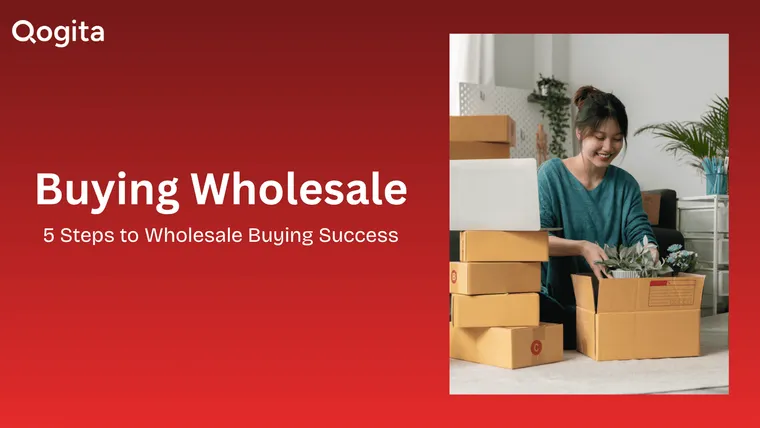Who is allowed to buy wholesale? Do you need specific UK licenses to purchase stock? How much cheaper is it to buy wholesale? And where do you find reliable suppliers?
These are the essential questions every retailer faces when trying to secure competitive profit margins. The sheer volume of outdated information online, coupled with relentless marketplace pressure, makes the simple act of sourcing feel complex and risky.
To truly succeed, you need clarity, not confusion, on the buying process.
In this wholesale UK guide for retailers, you’ll learn exactly what you need to know about setting up, vetting suppliers, and how to confidently buy wholesale products in the UK to build a successful, profitable inventory.
What Does It Mean to Buy Wholesale in the UK?
Buying wholesale means purchasing products directly from suppliers such as manufacturers, distributors, or established wholesalers at lower prices, usually in larger quantities.
Retailers then resell these products at a markup, earning a profit from the difference. Instead of buying items one by one at full retail price, wholesale allows retailers to pay less per unit because they commit to bigger orders.
For example, a UK artisan coffee roaster might sell a bag of beans to a wholesaler for £5.00. The wholesaler then sells it to your small independent café for £7.50.
You (the retailer) then sell the bag to a customer for £12.00, generating your profit. The entire system is built around this chain of bulk purchasing.
Wholesale vs. Retail: The Difference that Matters
Understanding the key differences between the wholesale and retail trade is essential for setting your financial strategy:
The supply chain is not always tidy. Modern UK retailers often look to bypass the traditional wholesaler to negotiate better terms directly with the manufacturer.
Conversely, some major producers sell products wholesale to supermarket chains, but also operate their own D2C (Direct-to-Consumer) online stores.
Navigating these options is key to securing your best margin.
Wholesale vs. Bulk Buying
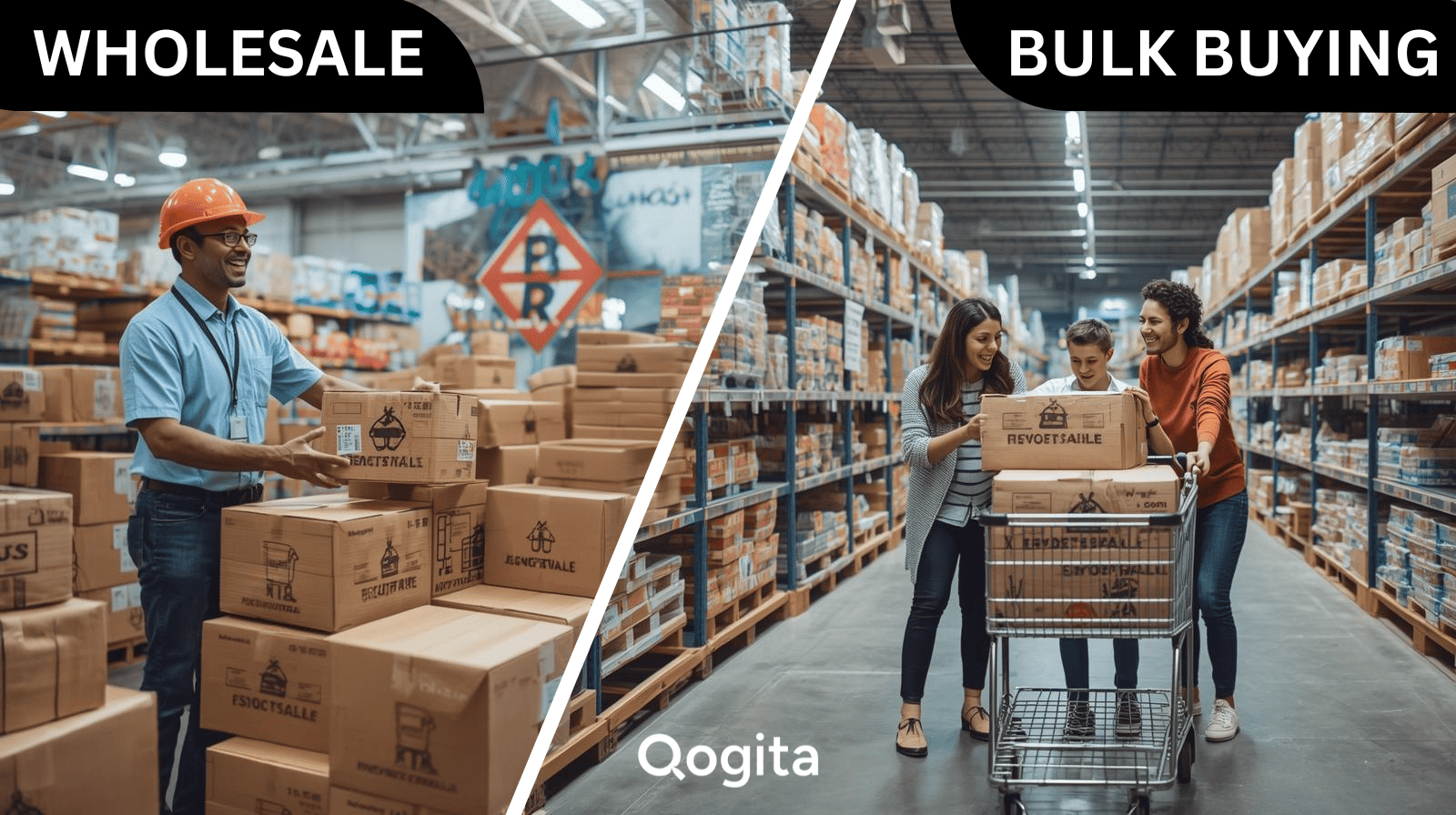
The greatest financial mistake a new retailer can make is confusing a simple volume discount with a true wholesale trade price. While all wholesale buying is done in bulk, not all bulk purchases are wholesale.
The difference is critical for your bottom line:
- Wholesale establishes a professional B2B relationship, granting you access to a trade price engineered for a profitable resale margin (often 50% or more). You must provide business proof to access this.
- Bulk Buying is a personal tactic that secures a minor volume discount on a near-retail price. It is only suitable for items like cleaning supplies or packaging, and will severely damage your profit if used for resale inventory.
Let's understand the difference more clearly with a practical example:
Consider a UK Cash and Carry warehouse. You can buy 50 units of a product. If you use your registered Trade Account and provide HMRC details, you receive the B2B wholesale rate. If you use a personal membership card, you receive a simple volume discount.
Same quantity, completely different pricing structure and margin potential.
For retailers, the question is always: Does this discount provide the necessary margin for resale? If the answer is no, it’s a bulk deal, not a wholesale one.
A real wholesale price is structured so you can buy a product for £5 and confidently sell it for £10, making a healthy profit.
If a supplier gives you a "bulk discount" that only lets you sell for £5.80, that is not a wholesale price, and you cannot build a business on it.
Is Wholesaling Legal in the UK?
The answer is a simple Yes.
There are no special licences, permissions, or government certificates needed to operate as a wholesale buyer or seller in the UK. Wholesaling is simply a business-to-business transaction (B2B).
The confusion for new retailers often comes from what you need to prove to a supplier to get access to their trade price list.
The True Legal Requirement: Business Status
The law does not question the legality of wholesaling, but the supplier questions your business status. This is done for two main reasons:
- VAT/Tax Compliance: The supplier needs proof that you are a legitimate business for their own accounting and tax records (HMRC).
- Protecting the Supply Chain: They need to confirm you are a retailer who will resell the goods, not a consumer trying to get a discount.
To satisfy a wholesale supplier and prove you are a legitimate business, you will usually need to provide one or more of the following official documents:
- HMRC Registration: Your official self-employment or small business registration number.
- VAT Registration: If your business is VAT-registered, this is the strongest proof.
- Company House Details: Your official company registration number (if you are a Limited Company).
- Business Bank Account or Utility Bill: A statement or bill in your trading name and address.
In short, wholesaling is entirely legal, but getting a supplier to sell to you at a wholesale price requires you to act like, and prove you are, a professional business.
Who Can Buy Wholesale in the UK?
The common misconception is that you need to be a large, established High Street brand to access wholesale prices. This is not true.
In the UK, the answer to "Who can buy wholesale?" is very simple: Any person or entity who can prove they are a legitimate business buying products for resale or for commercial use.
The simple rule is that you must be a reseller. The primary distinction a wholesaler makes is between a consumer (someone buying for personal, end-user consumption) and a trade buyer (someone buying for business use).
If you're a trade buyer, you can buy wholesale. On the other hand, if you're a consumer, you cannot buy wholesale.
Types of UK Businesses That Buy Wholesale
Wholesalers cater to a vast range of legitimate business structures. If you are registered with HMRC and actively trading, you are a qualifying buyer. This includes, but is not limited to:
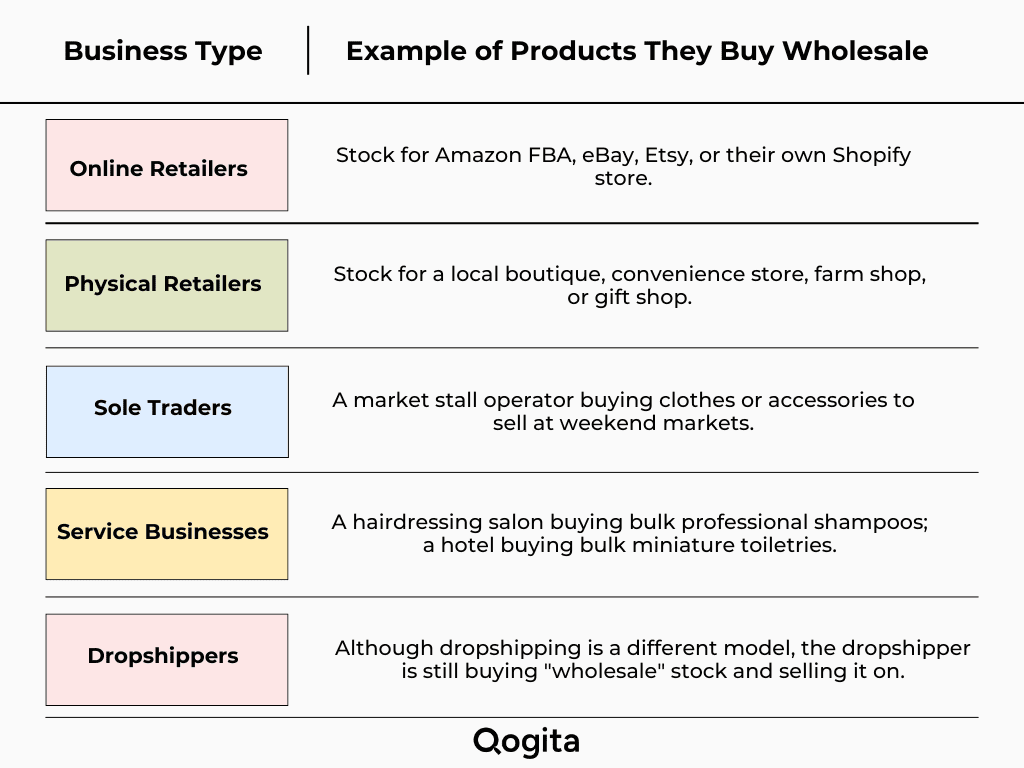
Does My Business Have to Be VAT Registered?
No. You do not need to be VAT-registered to buy wholesale in the UK.
- You must be registered as a business with HMRC (His Majesty’s Revenue and Customs), either as a Sole Trader or a Limited Company.
- VAT registration is only compulsory once your annual taxable turnover exceeds the UK threshold (currently £90,000 for the 2024/25 tax year, although this figure is subject to change).
- For a new, small business, a supplier will be satisfied with your basic company registration details.
The key takeaway is that the barrier to entry is not size, but verification. Once you can provide basic company proof, the wholesale market is open to you.
Benefits and Pitfalls of Buying Wholesale in the UK
Buying wholesale can open doors for UK retailers, from lower costs to a wider product range. But alongside the benefits, some risks can cut into profits if you’re not careful.
Here’s a quick look at the benefits and the mistakes to watch out for:
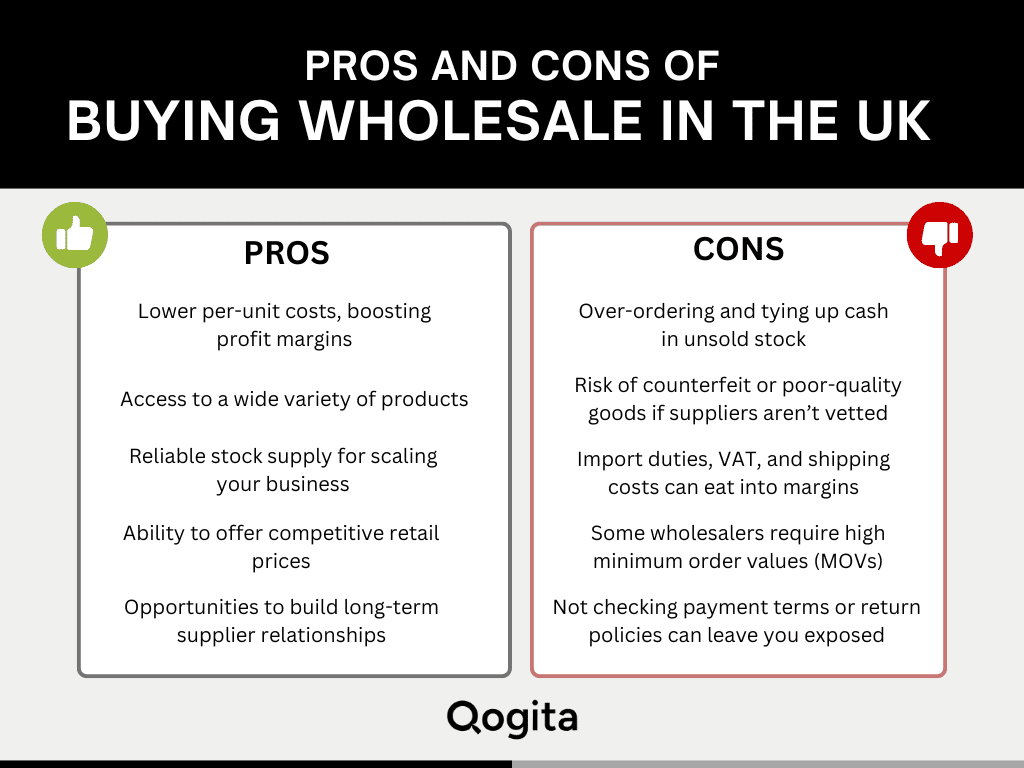
How to Buy Wholesale in the UK?
Buying wholesale is simple on paper: bulk in, margin out. The real trick is knowing how to find the right suppliers, cut smart deals, and keep your cash flow intact.
Here is your road map to how to buy wholesale for your business:
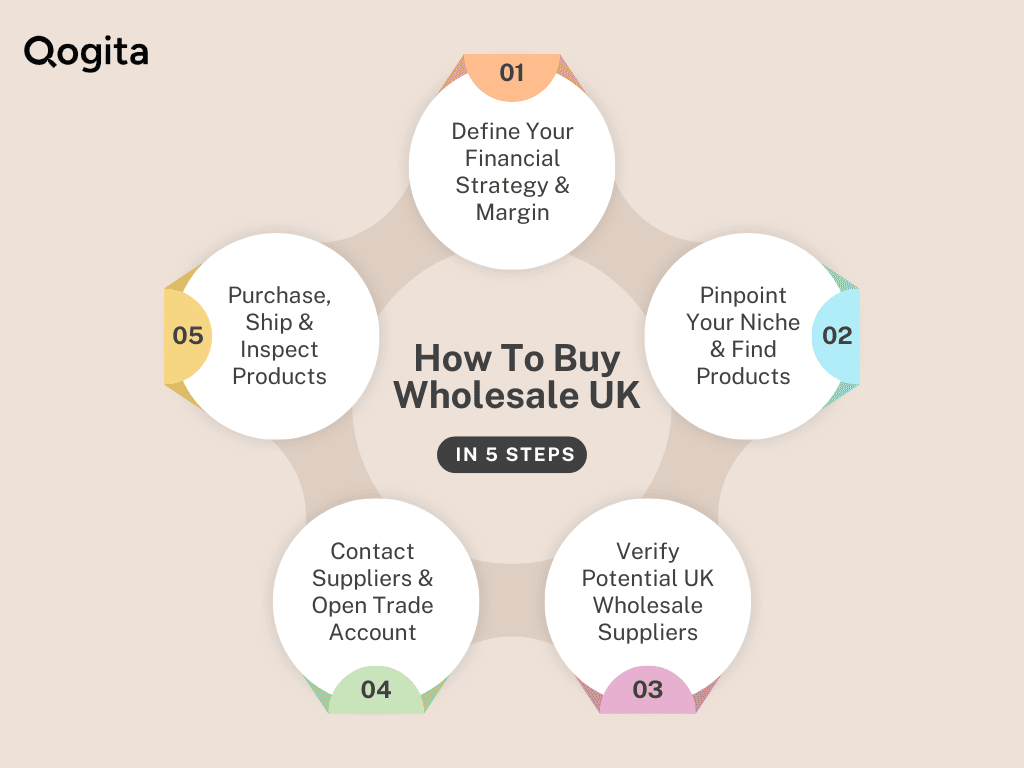
Step 1: Define Your Financial Strategy and Margin
A professional wholesale buyer approaches a supplier with a clear financial plan. This step is about internal strategy, which means knowing your numbers before you even look at a price list.
Calculate Your Target Margin
The quickest way to lose money is to buy stock before you know your selling price. Always work backwards:
Wholesale Cost=Target Retail Price−(VAT+Shipping+Operational Costs+Required Profit Margin)
- Never assume a standard margin. You must factor in all your UK costs, including storage and UK delivery charges to your customers, as well as the 'landed cost' (UK customs and duties), unless your supplier or marketplace like Qogita guarantees customs clearance. This total calculation finds the maximum price you can afford to pay wholesale.
- If a supplier’s unit price does not allow for a healthy 50% margin or more, they are not the right fit for your business model.
Establish Cash Flow and Inventory Budget
Wholesale is defined by bulk, and bulk means tying up capital in inventory.
- Determine the maximum amount of cash you can realistically spend on your first inventory purchase without jeopardising other operational costs (like marketing or shipping materials).
- Keep this budget firm. It helps you navigate the Minimum Order Values (MOVs) set by suppliers, ensuring you do not over-commit on your first order.
Secure Essential Commercial Insurance
For your protection, put the necessary policies in place before you receive stock:
- Product Liability Insurance: Protects you if a product you sell causes injury or damage to a customer. This is essential, even for low-risk items.
- Public Liability Insurance: If you operate from a physical location or attend market events, this covers claims of injury or property damage made by the public.
Step 2: Define Your Niche and Pinpoint Product Specifications
Success in wholesale buying starts with knowing exactly what will sell and the quality standards you require. This step ensures you source products that meet market demand as well as the regulations.
Conduct Market Research & Identify Gaps
Use your target categories to find underserved areas in the UK market. Here are some examples for you:
Finalise Product Specifications
A professional buyer doesn't ask for "some shampoo"; they ask for specifications. This allows you to compare quotes accurately.
- Hair & Face: When sourcing a new line of Hair care or Face serum, be aware of the precise brand, ingredients, and container sizes. For example: "Seeking Olaplex No.4 Bond Maintenance shampoo, 250ml size"
- Body: For Body washes or lotions, define the required certifications (e.g., Cosmos or Soil Association organic status) to confirm the product meets your USP.
- UK Compliance Check: Ensure your chosen products already hold the necessary certifications, such as UKCA (for electronics), or comply with UK cosmetic labelling laws, before placing a large order.
Step 3: Research and Verify Potential Wholesale Suppliers
Finding the right supplier is one of the most important steps in buying wholesale in the UK. Your supplier will impact product quality, delivery reliability, pricing, and ultimately your profitability.
Supplier Red Flags to Avoid
Keep your eyes open for these warning signs that often indicate poor quality, lack of professionalism, or potentially counterfeit goods:
- Pricing Way Below Market: A supplier offering well-known brands (e.g., Versace, Dolce & Gabbana, etc.) at prices that seem too good to be true is often selling counterfeits or damaged stock.
- Payment Demands: Insisting on unsecured payment methods like personal bank transfers or Western Union, with no option for business credit card, PayPal, or pro forma invoicing.
- Unverified Details: A lack of professional digital presence, generic email addresses (e.g., @gmail.com), or business addresses that cannot be verified on UK maps.
- Low-Quality Imagery: Using stock photos instead of original, high-resolution images of the body products, health supplements, or the actual inventory in their warehouse.
The UK Verification Checklist
Legitimate UK wholesalers selling genuine brands will welcome your scrutiny. Request this information:
- Check Business Registration: In the UK, use the Companies House register to verify that the supplier is an active Limited Company (Ltd). For sole traders, ask for their HMRC registration/UTR.
- Demand Proof of Origin: If you are buying branded fragrance or cosmetics, ask for documentation proving they are an authorised distributor or seller. This protects you from legal issues.
- Leverage B2B Marketplaces: Platforms like Qogita remove much of the hassle by pre-vetting suppliers and managing payments. They offer a layer of security which is often missing when dealing with unknown suppliers directly.
- Review Their Reputation: Use independent UK review sites (e.g., Trustpilot) to search for feedback on their customer service, delivery reliability, and packaging quality, especially for delicate items like home & lifestyle accessories.
Pro Tip: Your supplier should know their product inside out. If you are sourcing specialist Hair dyes or specific face creams, they should be able to provide expert advice on ingredients, compliance, and market trends.
If they are just box-shifters, they are less valuable as a partner.
Step 4: Contact the Suppliers and Apply for a Trade Account
This stage marks your transition from researcher to professional buyer. The goal is to secure a trade account and access the confidential, tiered pricing structures that are the foundation of your profit margin.
Professional Outreach and Verification
When you first contact a supplier (whether via email or phone), your introduction must be professional, brief, and clear.
Immediately state your business niche (e.g., "We are an online retailer specialising in premium homeware," or "We operate a regional chain of specialised shops").
To avoid delays, immediately provide your HMRC Unique Taxpayer Reference (UTR) or your Companies House registration number. Suppliers use all these details to confirm you are a genuine reseller and not a consumer seeking discounted stock.
Important Questions to Secure the Best Terms
Before placing a single unit order, you must clarify the supplier's terms regarding stock, logistics, and payment. Use these questions to guide your conversation and secure the best possible terms:
- What is the Minimum Order Value (MOV) required for complimentary UK shipping?
- Do you offer tiered pricing, providing a lower unit cost for larger volume commitments?
- Can I purchase a small sample kit of the product line before committing to the full MOV?
- What is the average lead time (delivery time) for a standard order, and which traceable courier do you use?
- What is your clear returns policy for stock that arrives damaged or faulty?
- What are your standard payment terms for new trade clients?
- Can you provide high-resolution product imagery and marketing copy for the product lines?
Opening the Trade Account
The final administrative step involves completing their trade application.
Once your documentation (HMRC/Companies House) is approved, you will receive login details for their online trade portal or a dedicated price list.
For your very first order, expect to pay Pro Forma (full payment upfront). This establishes your reliability.
Once you have a history of placing and paying for orders on time, you can then negotiate for Net 30 or Net 60 credit terms, which is crucial for managing your business cash flow effectively.
Step 5: Purchase, Shipping, and Final Vetting
With a supplier selected and your trade account ready, the last step is to order your products, handle delivery, and make sure everything is in top condition before it reaches your customers.
Place a Detailed Purchase Order (PO)
Create a purchase order outlining product specifications, quantities, agreed prices, delivery dates, and any special instructions.
This document is vital. It protects both parties, prevents disputes, and serves as your legal reference.
For example, a UK stationery retailer ordering 200 notebooks must specify the cover design, paper stock, SKU numbers, and packaging requirements to ensure accuracy.
Understand and Negotiate Payment Terms
Negotiating payment terms is very important for maintaining healthy cash flow. Wholesale suppliers may request:
- Pro Forma: Full upfront payment (common for first orders).
- Split Payment: (e.g., 50% upfront, 50% on delivery).
- Net Terms: Payment due 30 or 60 days after delivery.
Always negotiate terms that protect your working capital. While new retailers usually start with upfront payments, reliable suppliers often offer Net 30 terms once trust is established.
Track Shipping and Landed Cost
Confirm all shipping details, including the carrier, tracking numbers, and firm expected delivery dates.
If you are importing products from outside the UK, calculate the Total Landed Cost. This includes the wholesale price plus VAT, customs duties, and all shipping fees.
For example, a UK homeware shop importing candles from Europe must factor in these duties to avoid surprises that could eradicate profit margins.
Inspect and Vet Products Immediately on Arrival
Do not sign the delivery note until you have verified the box count. Upon delivery, check that quantities match your PO and inspect product quality carefully.
Document any damages, defects, or missing items with clear photographs. This must be done quickly as most suppliers enforce a strict claim window of 24 to 48 hours.
A small UK beauty retailer receiving a batch of skincare products with damaged packaging must resolve the issue immediately to maintain brand reputation before selling to customers.
Maintain Accurate Records
Keep copies of all invoices, delivery notes, and correspondence. Accurate record-keeping is essential for VAT reporting, end-of-year bookkeeping, and streamlining future bulk orders.
Obviously, you won't be able to keep track of every last invoice and tax record on your own.
That's why we recommend using accounting tools like QuickBooks, Xero, or integrated systems like Shopify to track wholesale purchases efficiently.
Pro Tip: Start with a smaller order to test both supplier reliability and initial product demand.
Once you confirm the quality and service, you can confidently scale up future orders as you'll know that your wholesale supply chain is secure.
Where to Buy Wholesale Products in the UK?
Here is an overview of the most effective channels for sourcing wholesale goods in the UK:
1. Direct Sourcing Channels
These channels offer the lowest prices but often have the highest Minimum Order Values (MOVs).
- Manufacturers/Official UK Distributors: The best source for established brands. Contact the manufacturer directly and ask for their list of authorised UK trade distributors.
- UK Trade Shows: Events like Spring Fair, Autumn Fair, Pure London, or regional food and gift shows let you meet hundreds of vetted suppliers in a single day. You can physically inspect the stock, negotiate terms, and build relationships face-to-face.
2. Online B2B Marketplaces
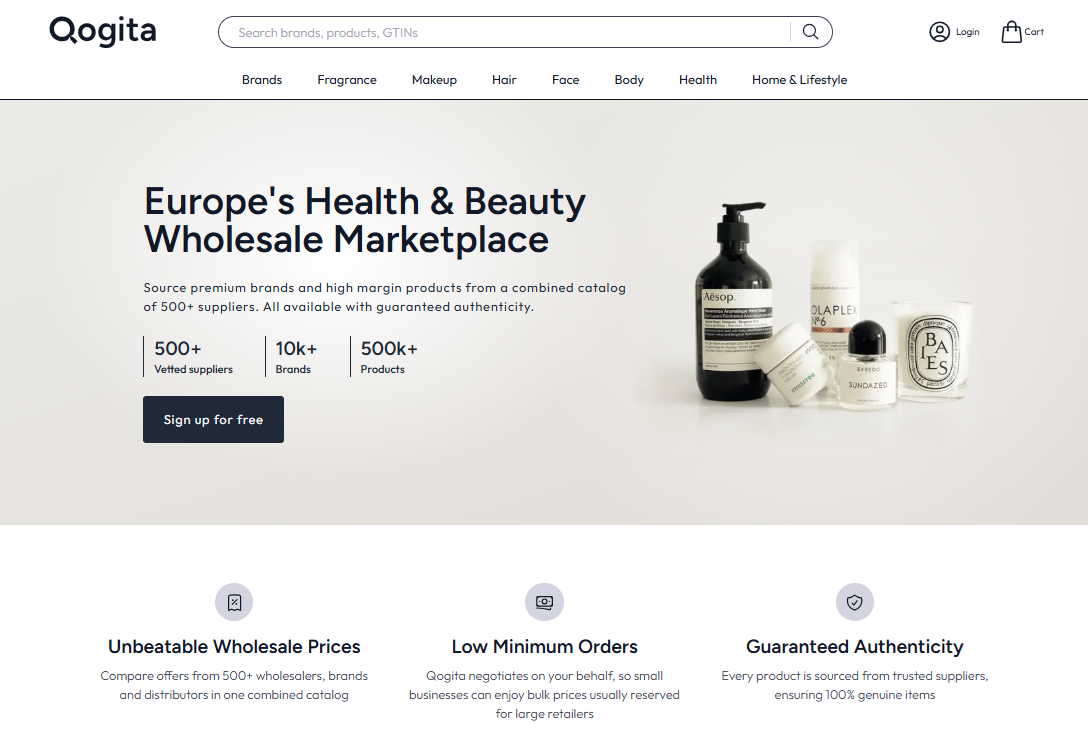
Qogita is an online wholesale marketplace that connects independent retailers with professional suppliers and manufacturers to browse and order products wholesale online.
It’s essentially a B2B platform designed for local retailers to discover and stock thousands of well-known and professional brands from a variety of categories like health, beauty, and more.
3. Clearance and Liquidation
These are high-risk, high-reward sources for acquiring goods below market price.
- Specialist Job Lot Websites: Companies dedicated to buying and breaking down massive pallets of returned or surplus stock into smaller, manageable lots for small retailers.
- Wholesale Cash & Carry Warehouses: Physical locations where you can purchase bulk items without placing an advance order, though pricing is often slightly higher than direct wholesale.
Is Wholesale Clearance in the UK Legit?
Yes, wholesale clearance, job lots, and liquidation sales are completely legitimate within the UK retail supply chain.
This is a common and legal business practice used by manufacturers and large retailers to efficiently manage inventory.
Clearance occurs when businesses need to quickly sell surplus, discontinued, end-of-line, or customer-returned stock to free up capital and warehouse space.
Conclusion
Buying wholesale in the UK remains one of the most reliable ways for retailers to cut costs, widen their product range, and build a profitable business.
The key, however, lies in preparation. Choosing the right supplier, understanding terms, and managing your inventory wisely will determine whether wholesale becomes a growth driver or a costly mistake.
Wholesale can be the foundation of a strong and sustainable retail business if you plan carefully and make smart decisions.
FAQs
How can I get wholesale?
To purchase wholesale, you must have a registered business in the UK. Research reputable suppliers, set up a trade account, and provide proof of your business, such as a company registration number or VAT ID. Once approved, you can place bulk orders at discounted rates.
Is it worth buying wholesale in the UK?
Yes, it is essential for retail profitability. Buying wholesale lowers your per-unit cost and allows you to achieve healthy profit margins. It also ensures consistent stock availability, gives you access to diverse products, and reduces shipping times and costs.
Where to buy wholesale products in the UK?
You can buy wholesale from UK-based suppliers, distributors, trade shows, and B2B marketplaces like Qogita and Faire. Some manufacturers also sell directly to registered retailers.
Do wholesalers in the UK offer returns or warranties?
Wholesalers generally accept returns for faulty or damaged goods, but not for buyer's remorse, unlike B2C sales. They impose a very strict claim window (24-48 hours post-delivery) so check their specific policy and product warranties carefully before ordering.

